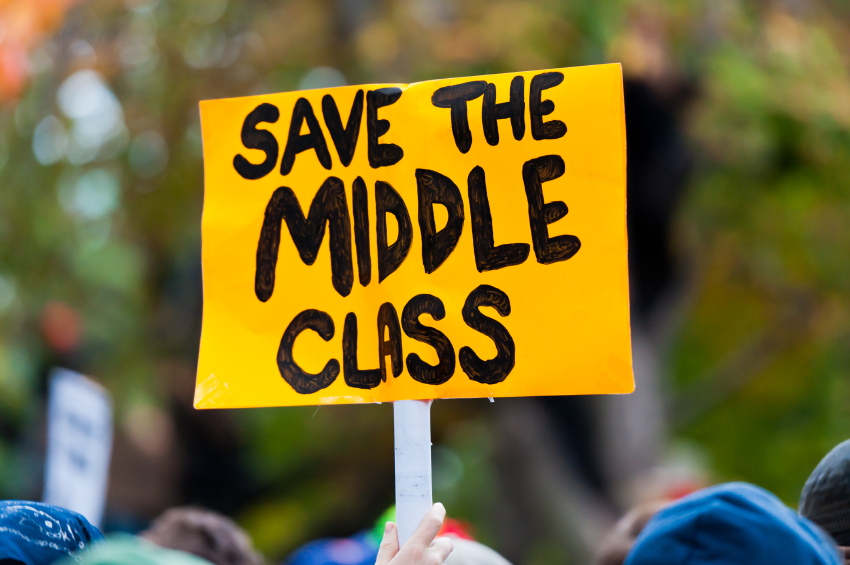President Obama wants to build a thriving middle class. The middle class just wants to be left alone to thrive.
Videos by Rare
On Wednesday at Knox College in Illinois, Mr. Obama delivered what was billed as a major economic address. In some ways it was a typical Obama production, claiming outsized credit for exaggerated achievements while ladling out copious blame to the usual suspects. The speech generated excitement among some commentators who seemed to confuse talking with actually doing something. Past presidents have used such events to introduce a legislative agenda complete with budget requirements and cost estimates, or a series of specific new policy proposals. But Mr. Obama prefers to talk about visions more than plans, and concepts more than policies. It is one reason why not much gets done between his periodic pivots back to the economy. He paraphrased local hero Carl Sandburg, saying “if we set our eyes on the horizon, we too will find an ocean of tomorrows, a sky of tomorrows.” The horizon is also something you can never reach.
There is no argument that there is a problem. Americans agree that the country is seriously moving in the wrong direction. A series of recent polls — ABC News/Washington Post, NBC/Wall Street Journal, Pew, McClatchy Marist, and Gallup – show dissatisfaction levels ranging from 60-68%. A Rasmussen poll from last week showed that almost half of Americans think the country’s best days are in the past, and only 36% are hopeful they lie in the future.
Mr. Obama says middle class woes can be traced to a variety of factors, such as changing technology, foreign competition, tax cuts, credit cards and Republicans. He said the recession was caused in part by “a churning financial sector [that] kept the economy artificially juiced up,” which is remarkably un-selfconscious considering the Federal Reserve is currently spending $85 billion a month to do just that. He also noted that on his watch the “average CEO has gotten a raise of nearly 40%” but “the average American earns less than he or she did in 1999.” He neglected to mention that most of the decline in earnings has occurred in the last four years.
Mr. Obama wants “a better bargain for the middle class and folks working to join it” and “an economy that grows from the middle-out.” The expression “middle-out” is apparently being promoted as an alternative to “trickle down” or “bottom up.” But it has an unfortunate connotation with the middle class in serious decline. Every sign in the economy and from the government seems to be saying, “Middle, out!”
Small business has always been a symbol of a healthy middle class; prosperous, independent, the traditional engine of job creation. But confidence among small business owners is down. Their two top concerns are government regulation and taxes, but Mr. Obama did not address either of them in his speech. He probably does not understand why business-people see government as a problem. The administration’s vision for building the middle class is all about government spending, not fostering a sound business climate. Remember that this is an government that believes that record numbers of people on food stamps is good for the economy. This is the White House that told us that unemployment benefits create jobs and growth. This is a president who stubbornly refuses to accept that his signature legislative achievement, Obamacare, is a job-crushing regulatory nightmare that will raise health care premiums and reduce middle class disposable income.
There are many reasons why the middle class is declining, but much has to do with the expansion of government. Middle class people face unique disadvantages, making too much (or being too proud) to take government handouts, but not making enough to lobby for legal loopholes, special benefits and other advantages enjoyed by those with wealth and access. They operate on increasingly slimmer margins, raising the risk of sudden failure should some government functionary decide a rule needs to be reinterpreted, or when an agency decides there simply aren’t enough regulations.
The president wants to give middle class a better shot at living the American dream. Yet it might come as a surprise to him to learn that the middle class does not need him in order to be successful. If anything they need less of him and what he represents – fewer regulations, lower taxes, lower debt, fewer government intrusions in their lives and jobs. Throughout history the middle class has always flourished when the government limits itself to serving them rather than trying to be their savior.
James S. Robbins is Deputy Editor of Rare and author of Native Americans: Patriotism, Exceptionalism, and the New American Identity. Follow him on Twitter @James_Robbins




One Comment
Leave a ReplyOne Ping
Pingback:Poll: Only 12 percent think Obamanomics helps the middle class | Rare